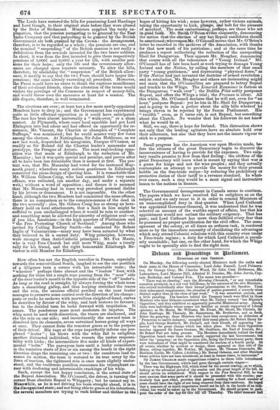How often has not the English traveller in France, especially
towards the semi-civilized South, laughed to see the one postilion of a diligence turn a corner with his intractable team ; the "wheelers" perhaps three abreast and the "leaders " four, with nothing for reins but a single rope passing from the " near" side of the near leader's mouth to the opposite side of the " off" leader's. As long as the road is straight, by always forcing the whole team into a shambling gallop, and thus keeping stretched the traces and the rein, the anxious official perched on the near leader manages to preserve some control over the direction of his charge : posts or rocks he eschews with marvellous sleight-of-hand, curves he describes by favour of the whip, and luck bestows its favours ; but to the decided turn he looks forward with trepidation. It comes. The ponderous mass must moderate its impetus. The whip must be used with.discretion, the traces are slackened, and eke the rein on one side; and incontinently the onward team is dissolved into its elements, seven untrained horses going all ways at once. They cannot form the remotest guess as to the purpose of their driver. His tugs at the rope imperfectly inform one per- plexed "leader " ; his blows with the whip fail to enlighten another distracted individual, who resents the undue responsi- bility with kicks ; the intermediate five make all kinds of experi- mental " bolts." The paroxysm lasts until a lucky coincidence in the tentative starts of five or six among the beasts in the right direction drags the remaining one or two : the cumbrous load re- sumes its motion, the team is restored to its true array by the force of traction, the tightened rein is once more slightly under- stood, and the vociferous postilion reassumes his triumphant ca- reer with deafening and interminable crackings of his whip. Such, except the last happy conclusion, is the actual state of the Repeal Association. Mr. O'Connell, the driver, is turning the corner from absolute Repeal to Whiggery ; but he cannot say so. Meanwhile, as he is not driving his team straight ahead, it is in the disorganized state; and not being able to guess at his intentions, the several members are trying to rush hither and thither in the hopes of hitting his wish ; some however, rather vicious animals, taking the opportunity to kick, plunge, and bolt for the pleasure of mischief. The most embarrassing, perhaps, are those who act in. good faith. Mr. Smith O'Brien writes eloquently, denouncing the notion that the election of any but Repeal candidates should be sanctioned; whereuponair. O'Connell moves that Mr. O'Brien's letter be recorded in the archives of the Association, with thanks for that new mark of his -patriotism ; and at the same time he produces a report authorizing the reelection of the unrepealing Sheil for Dungarvan. Then appears Mr. Meagher, denouncing that course with all the vehemence of "Young Ireland." Mr. O'Connell has of late been hard at work trying to damage Young Ireland and the Nation, by calling the members of that party "young gentlemen," and deprecating "physical force," as if the Nation had just invented the doctrine of armed revolution ; and in retaliation, Mr. Meagher and others are insinuating might and main that the O'Connellites are prepared to betray Repeal and truckle to the Whigs. The Lim,eriek Examiner is furious at the Dungarvan " walk over "; the Dublin Pilot softly postpones Repeal, and offers the Whigs a trial; the Freeman is silent. All this while, Mr. O'Connell declares that he will not, even for "an hour," postpone Repeal: yet he lets in Mr. Sheil for Dungarvan; and is going to raise a pother about the silly bills whereof he brings eleven to be rejected by the Saxon Parliament. His " twelfth " even, as it turns out, is not Repeal, but something about the Church. No wonder that his followers do not know what he would be at.
Still; we say, there is hope for Ireland. This distraction shows not only that the leading agitators have no absolute hold over their adherents, but also that they have not the innate vigour to stick to a purpose.


























 Previous page
Previous page